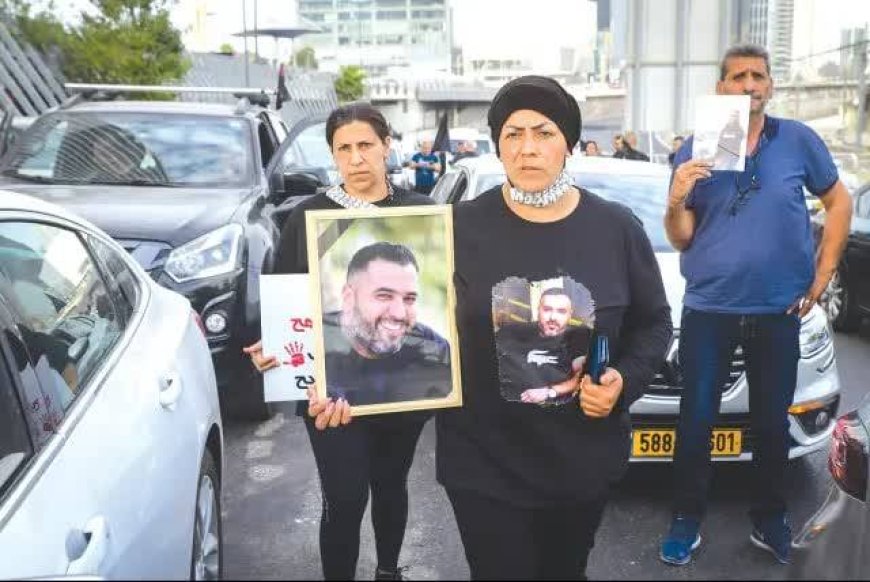The 1948 Arabs: For Arabs living under Israeli occupation, the world is a dangerous place

Israel has long grappled with the social challenges of inequality and economic injustice within the territories it occupies. However, these challenges are especially acute in areas inhabited by Arab communities. In fact, the socioeconomically disadvantaged demographic group in the occupied territories predominantly comprises Arab families. On each occasion that a protest against rampant racism and prejudice occurs, the Israeli occupation responds with harsh methods and even threats of deportation.
According to the Hebrew daily "Israel Hayom," the occupied territories experienced a total of 690 instances of homicide between the years 2018 and 2022, resulting in the loss of 731 lives. The statistical breakdown of the victims reveals that 70% of the victims were of Arab descent, while 24% were of Jewish origin, with the remaining 6% comprising individuals from other ethnic backgrounds. This is despite the fact that Arabs make up only 21% of Israel's population.
Based on a recent survey, the monthly average of homicides in 2023 witnessed a substantial surge as compared to the figures from two years earlier. The Arab community witnessed an almost twofold increase in the monthly average, while the Jews saw a 65% rise.
Based on data provided by the Israeli police on reported criminal activities and their corresponding geographical locations, nearly 1.5 million cases were filed by law enforcement authorities from the beginning of 2018 until the end of the first quarter of 2023. Given the analysis of the incidence rate per capita, it can be inferred that the average number of cases reported annually is approximately 30 per thousand individuals. When comparing the number of murders and indictments from 2018–2022, just 29% of the indictments included Arabs, whereas 69% involved Jews.
The statistics clearly indicate that there are a high number of murders in Arab communities. In October 2021, the Israeli government allegedly devised a plan known as the "safe path", aimed at mitigating crime and violence in regions with a predominantly Arab population. The programme was initially set to last for six months but was later extended until the end of the national emergency in 2022. The data from this year indicates that the implementation of the initiative did not lead to a tangible change in terms of the decrease in homicide rates prevalent in Arab communities. Despite pledges of improved police station reach, the spike in murder rates, especially in Arab communities, can be attributed to poor surveillance and a lack of law enforcement personnel. Importantly, many of these murders took place in "safe path" zones.
It is worth noting that a portion of the street violence that occurs in Arab communities is linked to criminal organisations. Additionally, some incidents stem from familial disputes, which may not be reported to the authorities by the victim's family members.
Amidst rising concerns over the high rates of homicides and orchestrated crimes in Arab communities, the Arab Higher Monitoring Committee in Israel [AHMC] has called for marches to highlight the negative role that the government may be playing in exacerbating the situation. Demonstrations erupted on May 21st throughout the occupied territories as Arab citizens voiced their opposition to the Netanyahu cabinet's deliberative inaction in quelling the current outbreak of violence in Arab-populated areas.
What is significant is AHMC’s statement: "Crime in Arab society is the result of a deliberate policy. Thus, now that the violence has reached an all-time high and the number of victims is growing by the day, it is time for a real protest against the government to begin."
Today, Arabs residing in the occupied area view the surge in crimes as a deliberate and systematic manifestation of Israel's discriminatory practises.
Also, the prevalence of organised crime is exacerbating the already precarious security situation in occupied Palestine, leading to fatalities among Arab civilians. One crucial aspect that warrants attention in this regard is related to the Israeli government's leniency towards these criminal groups, alongside other underlying factors that fuel the killings and violence.
The Arab civilians of the occupied territories have been left with no hope of improving their situation due to the policies of successive Israeli administrations, culminating in the current extremist cabinet led by Netanyahu. This grim scenario demonstrates that the Zionist regime has shown little concern for the plight of the Arabs. This situation is a consequence of the insufficient distribution of funds and the Israeli government's disregard for the security concerns of the Arab community.
Less focus has been placed on the plight of Arabs living in the 1948 occupied regions due to the Zionist regime's ongoing atrocities against the people of Palestine in the West Bank and Gaza Strip.
Several international human rights organisations have accused certain nations of violating the rights of their citizens, mainly relying on fraudulent documentation. At the same time, the same human rights groups have turned a blind eye to the reported human rights violations against Arab civilians in the occupied territories, as well as the ongoing massacre of Palestinians by Israeli troops.













































